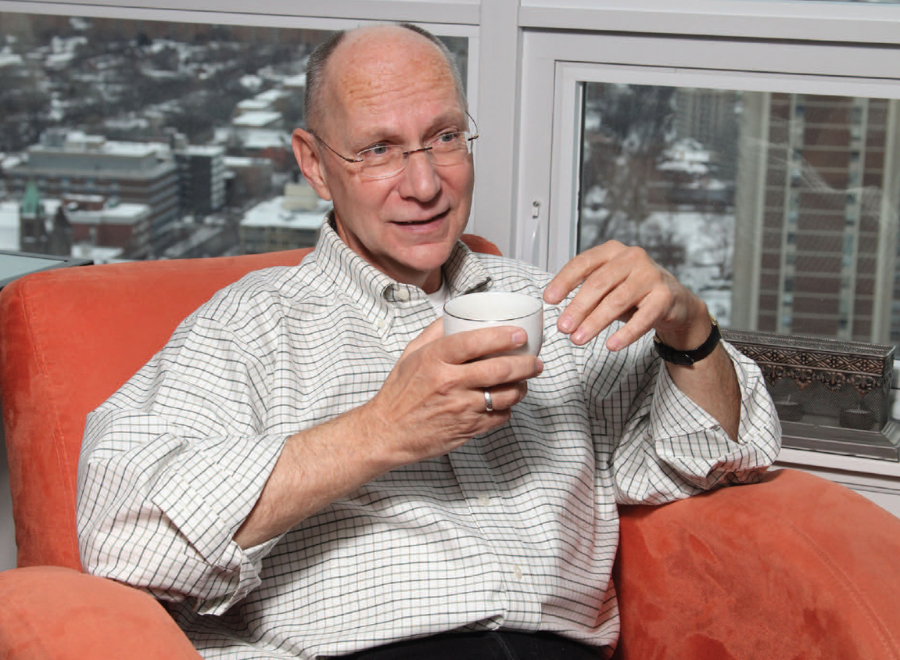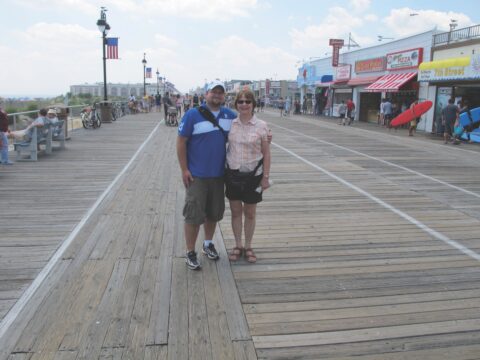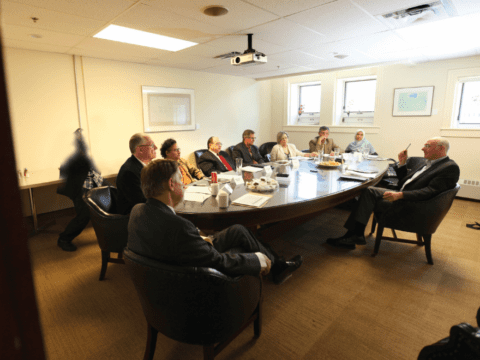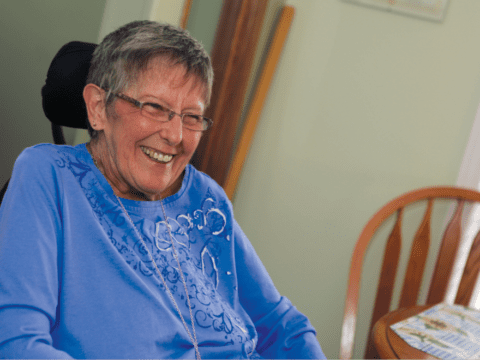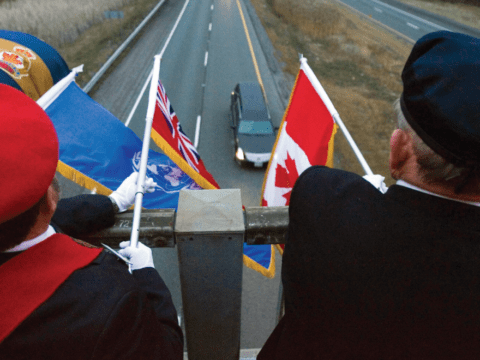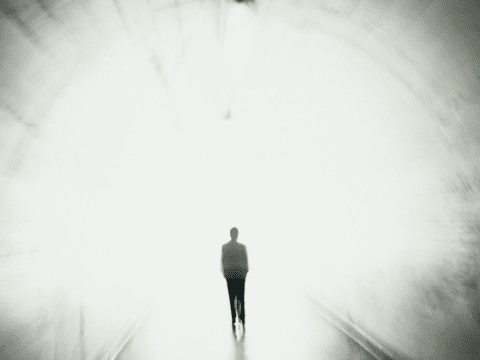Best known for his books on churches and climate change, former United Church program officer David Hallman changes gears in his new memoir, August Farewell, a love story woven around the shattering events of two weeks in the summer of 2009. He spoke with David Wilson.
DAVID WILSON: You’re well known in the global church for your analytical skills around environmental issues. Yet this story of losing your life partner, Bill Conklin, is intensely personal, often heartbreaking. Were you ever uneasy about revealing so much of yourself?
DAVID HALLMAN: Initially, I wrote it with no intention of anyone else reading it. About six weeks after Bill died, I became quite anxious about forgetting the details of those incredible 16 days between his diagnosis and his death from pancreatic cancer. To forget would be like losing him again. So I decided I would record the experience.
As I wrote, I started integrating some of the experiences Bill and I shared over our 33 years. Only after I finished did I decide to share [the work] with some close friends. They said it should be read by more people because it could be of help to others. It was then that I was faced with the question of how I felt about revealing such a personal story. I do have some anxiety about it — about people making judgments. But I can’t control that. I have to be prepared to accept the consequences.
DW: This is not just the story of your partner’s death. It’s also the story of your life together. It weaves back and forth. Did this structure suggest itself after the fact, or does it reflect the pattern of your thinking during those 16 days?
DH: Memory is very important to me. As I was writing the story of those 16 days I was reminded, almost in a stream-of-consciousness way, of our longer history — like a picture album. I started spontaneously integrating those flashbacks. So it was not a predetermined structure. It was almost like free association as I wrote it.
DW: But oddly, the book doesn’t read like free association. It reads thought out.
DH: Partly it reflects conversations Bill and I had during those two weeks about our 33 years together. We knew he was going to die, and so we became very intentional about saying our goodbyes and reflecting on our lives together. Those conversations prompted a lot of the recollections that found their way into the book.
DW: The recollections make the book more than a chronicle of those 16 incredibly intense days. More than anything, I read it as a love story.
DH: That’s a good observation. Those two weeks were a culmination of our life together, not something separate. It was very important for me to have that free flow between past and present because those 16 days were so excruciatingly painful. It would be unbearable if that were the only thing I was focusing on. I needed to be able to place them in the context of our 33 years together.
DW: Do you see the love-story subplot as part of a larger effort to foster better understanding of same-sex relationships?
DH: Friends and family convinced me there was a usefulness in sharing the love story, both to give a wider audience a glimpse of a committed, long-term, faith-based relationship that happened to be between two men, but also for people in the gay community, particularly young people.
I was very distressed by the series of suicides, particularly in the United States, this past September of young people who took their own lives because of bullying and homophobia. In response, there was a high-profile campaign called “It Gets Better” aimed at convincing young people that it is possible to find love in their lives. Here I was, sitting on this story. I came to believe I had a responsibility, that the Spirit was leading me, to make this story available, both to give hope to young people and also to challenge some of the sources of homophobia, much of which is religiously based. Ours was a relationship that was love-filled and in which our Christian faith was a fundamental shared value.
DW: Did it feel good to get your story down on paper?
DH: The experience was so emblazoned in my mind and my heart that as I gave in to the compulsion to record it, it just came. I opened my heart and it flowed. I wrote [the book] in about six weeks, non-stop. And cried almost all the time. But it felt reassuring to write it because it helped me deal with the anxiety of fearing I would forget things. To that extent it was therapeutic. I can always go back and read about the experiences we had. On the other hand, they don’t bring me comfort because they reinforce how much I have lost.
DW: Was there any time in the writing of the book when you felt it was just too tough to carry on?
DH: No. I just rolled and rolled — 10 hours a day. It consumed me, I did almost nothing else. What you see in the book is basically a first draft — that’s how it came out. In some sense, writing it was almost an out-of-body experience. It was like I was hovering above this person who was at his computer typing away. It was so unselfconscious that it felt like some-one else’s hands were at work. This was the first time I had written something remotely like this. Everything else had been more academic, and perhaps that prepared me in some way to do this, but it really was a world apart.
DW: Did you enjoy that part of the writing process?
DH: Yes, I did. As painful as it was, and as often as I was in tears, when I would get up from a day’s writing, I would feel almost an adrenalin rush. To be able to capture something through this kind of creative process — to have a sense that this was an authentic reflection — was intensely precious.
DW: Would Bill have been pleased to know you enjoyed writing this story?
DH: He was an intensely private person. So while I know he would have been pleased to know I enjoyed the writing, in my whispered ongoing conversations with him I keep asking for permission to share this amount of detail. I hope that I’m getting his permission, that he would be as convinced as I am that it’s for a greater good.
DW: In the book, you describe the deep religious faith you and Bill shared. Bill’s faith never seemed to waver, in spite of everything. How did Bill’s death affect your faith?
DH: I reread the book recently and was struck by how much hope there is in it. That came as a surprise because now, 18 months later, I’m in a much darker place — not in the sense of questioning my faith but in terms of becoming reconciled to the reality of what happened.
Some people have suggested that the faith we shared must have made the dying process easier. For Bill, I think it made it easier; as I relate in the book, he had a wonderfully transformative dream of walking in a garden with Jesus. But that was his dream, not mine. For me, I can’t say that my faith has made the experience easier. I can say that having a profound faith made the experience richer. And it has been a critical focus to have both that ongoing dialogue with God about the hell we went through and to have the support of the faith community of which I’m a part.
But God continues to get an earful.
***
This story first appeared in The United Church Observer’s April 2011 issue with the title “’I opened my heart and it flowed’.”

